Exploring Residential Zero Turn Mowers: Efficiency and Functionality
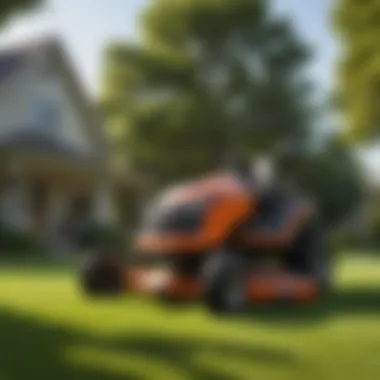
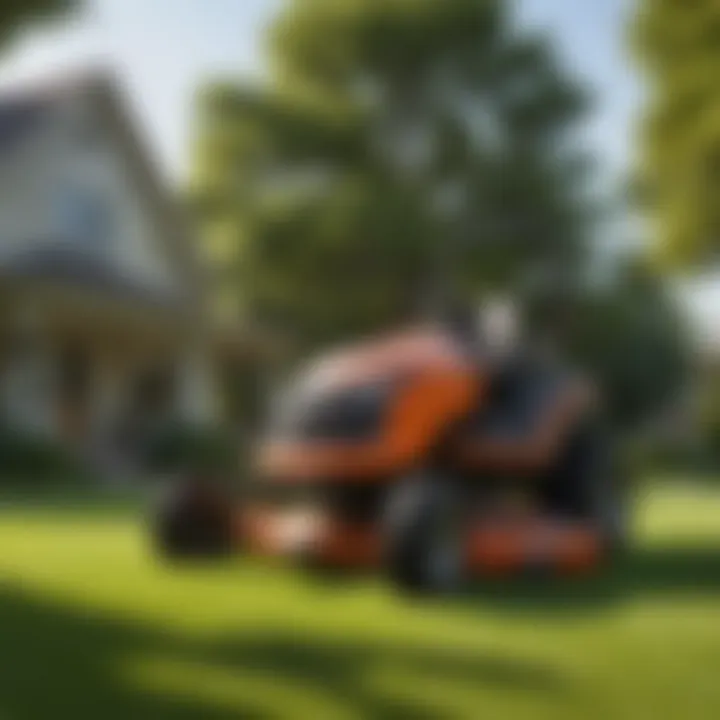
Intro
Residential zero-turn mowers are increasingly recognized for their efficiency and functionality in managing home lawns. With a design that prioritizes ease of movement and precision cutting, these mowers have become a staple for homeowners who take pride in their landscaping. This article aims to provide a deep dive into their various aspects, from design and performance to maintenance and selection. By studying these elements, homeowners can make informed decisions that enhance both their lawn care practices and overall gardening experiences.
Current Trends in Agriculture and Horticulture
Overview of Recent Innovations
The world of landscaping technology is rapidly evolving. Recent innovations in residential zero-turn mowers illustrate this trend. Manufacturers are integrating advanced features such as electric drive systems, which reduce emissions and minimize noise during operation. These models appeal to eco-conscious homeowners, while advanced cutting decks provide superior cut quality and efficiency. The advent of connectivity features, such as Bluetooth, allows users to track mower performance and maintenance needs through mobile applications.
Sustainable Practices Gaining Popularity
Sustainability is a significant trend among homeowners. As concerns about climate change rise, many are turning to zero-turn mowers that consume less fuel and have lower environmental impact. Models that utilize electric batteries, like the EGO Power+ Z6 or Cub Cadet's Ultima ZTX4, are gaining traction. These machines offer impressive run times and cutting power without the adverse effects of traditional gas-powered mowers.
"The shift towards more sustainable landscaping practices is not just trend; it's a necessity for the future of our environment."
Functionality and Efficiency of Zero Turn Mowers
The primary advantage of zero-turn mowers lies in their exceptional maneuverability. Zero-turn mowers, like the Husqvarna Z254 and John Deere Z335E, can pivot around obstacles with ease. This feature makes them particularly effective for complex landscaping designs found in residential areas. In terms of operational efficiency, they often reduce mowing time compared to traditional riding mowers due to their speed and cutting width.
Cutting Performance
Zero-turn mowers typically feature wide cutting decks, allowing for a cleaner and more efficient cut. The ability to adjust cutting heights with precision can provide a tailored mowing experience suited to varied grass types and seasons. These machines also offer mulching capabilities, allowing clippings to be recycled as lawn nutrition.
Maintenance Requirements
Understanding maintenance is vital for ensuring the longevity and functionality of a zero-turn mower. Regularly checking oil levels, inspecting blades for wear, and cleaning air filters are essential tasks. Scheduling seasonal tune-ups can also prolong the mower's lifespan. For instance, Troy-Bilt Mustang models offer easy access to engine components, simplifying maintenance and repair tasks.
Selection Criteria
When considering a zero-turn mower, homeowners should evaluate several factors:
- Size of the yard: Larger yards benefit from models with wider decks and longer run times.
- Terrain: For uneven or hilly landscapes, certain models provide better traction and stability.
- Budget: The market offers various price points, and it is essential to find a balance between features and affordability.
By approaching the selection process with these criteria in mind, homeowners can find the right mower to suit their specific needs.
Finale
The exploration of residential zero-turn mowers reveals their essential role in modern lawn care. From innovative designs to sustainable operation, these machines cater to the needs of today’s homeowners. Understanding their functionality and maintenance requirements allows users to make educated choices that enhance their gardening experience. Equipping oneself with knowledge when selecting a mower encourages better lawn management, ultimately resulting in beautiful outdoor spaces.
Understanding Residential Zero Turn Mowers
Understanding residential zero turn mowers is crucial for anyone involved in maintaining a lawn or garden. These machines represent a significant advancement in lawn care technology, combining efficiency and functionality. Their unique design allows for greater maneuverability compared to traditional riding mowers, making them suited for residential landscaping needs.
One of the key benefits of zero turn mowers is their ability to save time while achieving a neat cut. Homeowners and gardening enthusiasts often face the challenge of keeping their lawns pristine. Zero turn mowers tackle this problem effectively. The ability to pivot on a dime allows for precise navigation around obstacles like trees and flower beds, reducing the time spent on trimming and edge work.
Further, as residential properties vary in size and complexity, these mowers come in different sizes and with features that can be tailored to individual needs. Understanding these aspects ensures users can select the right model, enhancing their overall lawn care experience. It is also essential to consider the operational efficiency of zero turn mowers, as this impacts both performance and maintenance needs. Additionally, understanding what constitutes a zero turn mower prepares individuals to make more informed decisions when purchasing these tools for their unique landscaping requirements.
What is a Zero Turn Mower?
A zero turn mower is a type of lawn mower that allows for high maneuverability. This is primarily due to its unique steering system that uses two independent levers to control the rear wheels. This system grants the mower a turning radius of zero, enabling it to pivot around obstacles rather than working around them. These mowers are specifically designed for large residential lawns and commercial properties where efficiency and speed are vital.
Their distinct capability makes them preferable over traditional mowers, particularly in environments that require sharp turns and precise cuts. As a result, zero turn mowers not only provide a better cutting experience but also enhance the overall productivity of lawn care tasks.
The Mechanics of Zero Turn Technology
The mechanics behind zero turn technology are what make these mowers highly efficient. Unlike conventional lawn mowers, zero turn mowers feature a unique drive system. This system typically utilizes two hydraulic pumps and motors. Each rear wheel is powered independently, allowing the operator to control speed and direction very precisely.
This technology invites various advantages. For one, it decreases the turf damage thanks to the reduced turning radius. Additionally, the ability to move forward and backward efficiently minimizes the need for multiple passes when cutting grass around complex landscaping features.
The cutting deck design adds another layer of efficiency. Most zero turn mowers come with a wide cutting deck that facilitates quicker mowing. Homeowners can opt for different sizes based on the area size and thickness of grass. Overall, zero turn technology represents a step forward in mowing design, making it a valuable tool for homeowners and professional landscapers alike.
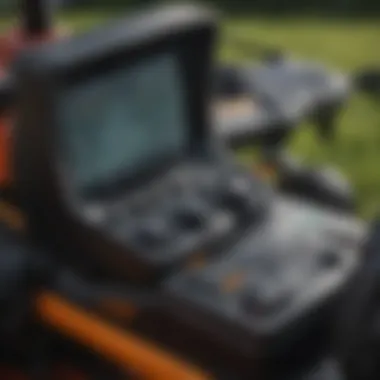
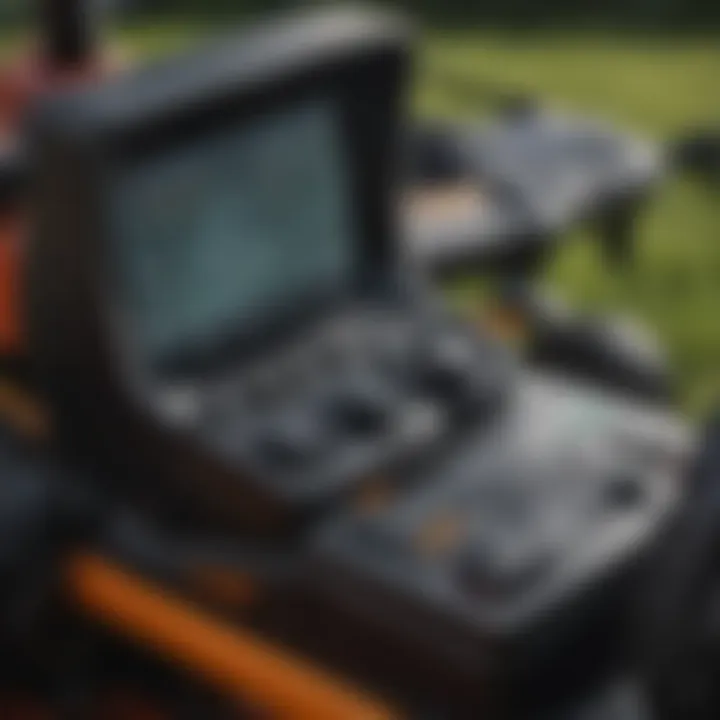
Key Features of Residential Zero Turn Mowers
Understanding the key features of residential zero turn mowers is crucial for making informed decisions when selecting the right equipment for your lawn care. These mowers stand out due to their unique design, which prioritizes efficiency, maneuverability, and effectiveness. By digging into specific elements such as control, cutting deck design, and engine power, users can appreciate why residential zero turn mowers might be the optimal choice for their needs.
Maneuverability and Control
One of the most significant advantages of zero turn mowers is their exceptional maneuverability. Traditional riding mowers require wide turning radii, which can be cumbersome in tight spaces. In contrast, zero turn mowers utilize a dual-lever steering system. This allows them to pivot sharply and navigate around obstacles with ease. Homeowners with intricate yards that contain gardens, flower beds, or trees will find this feature invaluable.
Furthermore, the control provided by zero turn mowers enhances the user's ability to drive smoothly across various terrains. Operators can make adjustments quickly, which minimizes the risk of damaging the grass or landscaping. The intuitive nature of the controls means that both new and experienced users can confidently operate these mowers without significant learning curves.
Cutting Deck Design
A vital aspect of zero turn mowers is their cutting deck design. This component is essential for determining the mowing efficiency and overall quality of cut.
Types of Cutting Decks
There are primarily two types of cutting decks: stamped and fabricated. Stamped decks are made from a single piece of metal, offering a lightweight option that can be cost-effective. On the other hand, fabricated decks are constructed from multiple pieces. They tend to be heavier and sturdier, offering better durability and longer lifespan.
The choice between these types influences not only the mower's price but also its performance. Homeowners who prioritize longevity and quality cutting will prefer fabricated decks, despite a higher initial investment.
Size Considerations
When considering a zero turn mower, users should pay attention to the size of the cutting deck. Sizes typically range from 32 inches to 72 inches. The right size can impact how quickly one can mow vast areas without sacrificing quality.
A larger cutting deck decreases mowing time but may be impractical for smaller yards or areas filled with obstacles. Alternatively, a smaller deck allows better maneuverability but requires more passes to cover the same area. Therefore, evaluating the size of one's lawn is critical in making a suitable choice.
Engine Power and Performance
Engine power and performance are determining factors for any lawn equipment. Zero turn mowers are available with various engine options, ranging from small single-cylinder engines to larger, more powerful models. A high-performance engine translates directly to improved speed and cutting capabilities.
The horsepower of an engine dictates how well it can handle thicker grass and challenging terrains. For homeowners with expansive lawns or those who deal with hilly terrain, investing in a mower with adequate engine power is crucial. Consequently, analyzing the terrain and lawn size before purchasing can lead to a more efficient mowing experience.
Advantages of Using Zero Turn Mowers
Understanding the benefits of zero turn mowers is crucial for anyone considering an upgrade to their lawn care equipment. Zero turn mowers offer specific advantages that can greatly improve lawn management efficiency. Homeowners need to recognize how these mowers enhance the quality of their work while reducing time and effort spent on lawn maintenance.
These mowers are designed to provide a superior cutting experience, making them a popular choice among gardening enthusiasts and professionals. From improved maneuverability to advanced cutting techniques, the advantages are numerous and impactful.
Increased Efficiency in Lawn Care
One key advantage of zero turn mowers is their increased efficiency in lawn care. With traditional lawn mowers, turning around often requires more space and time. In contrast, zero turn mowers can pivot, allowing operators to navigate tight corners and obstacles more effectively. This leads to a more uniform cut and reduces the number of missed spots.
Additionally, the design enables users to cover large areas without needing multiple passes. As a result, overall lawn maintenance becomes quicker and less labor-intensive. Reducing operational time also means that homeowners can enjoy their neatly manicured lawns sooner, which can be especially beneficial during peak growing seasons when frequent mowing is necessary.
Time-Saving Benefits
Time is a valuable resource, and zero turn mowers optimize it effectively. Homeowners often find themselves balancing multiple responsibilities, making efficient lawn care critical. These mowers not only cut down mowing time but also minimize the time spent on necessary maintenance tasks.
Due to their efficient design, users can mow their lawns more rapidly than with a standard riding mower. Many models offer features like adjustable cutting speeds, allowing homeowners to choose the pace that best fits their lawn’s condition. Moreover, zero turn mowers often come equipped with faster blade rotation, which provides a cleaner cut and reduces the need for additional trimming or touch-ups.
Precision Cutting Techniques
One of the standout features of zero turn mowers is their ability to execute precision cutting techniques. The agile maneuverability permits operators to navigate around landscaping features, flower beds, and other obstacles with ease. This precision also means that the grass can be cut to a uniform height, promoting better health and aesthetics for the lawn.
Furthermore, many zero turn models offer customizable cutting heights, allowing users to adapt their mowing practices to the specific type of grass and desired look. The end result is a neatly trimmed lawn that looks professionally cared for. Higher precision in cutting not only improves the appearance of lawns but also contributes to healthier grass, as properly maintained grass can resist disease and drought more effectively.
"Choosing a zero turn mower can transform the efficiency of lawn care and enhance the overall experience for homeowners, particularly those managing larger properties."
In summary, the advantages of using zero turn mowers extend well beyond convenience. They offer efficient performance, save time, and enhance precision. Homeowners must evaluate these benefits against their lawn care needs to make an informed decision that improves their overall gardening experience.
Considerations When Purchasing a Zero Turn Mower
Choosing a residential zero turn mower is a significant decision. It can affect how effectively you maintain your lawn. This section will discuss critical factors to consider. These factors will help ensure you select the right machine for your needs.
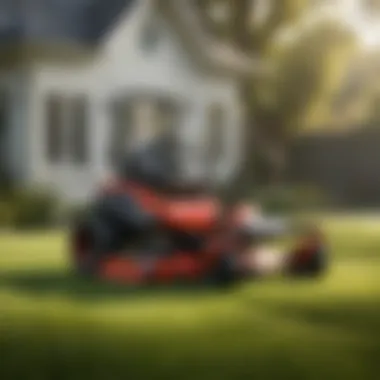

Evaluating Your Lawn Size
The size of your lawn is one of the first considerations. A zero turn mower is designed for larger areas. For lawns of one acre or more, a zero turn mower can save time. It provides faster cutting speeds and greater efficiency.
Smaller lawns may not require the features of a zero turn mower. A smaller mower could suffice for areas under half an acre. For instance, a compact riding mower may be easier to maneuver in tighter spaces.
Always measure your yard before deciding. Use your measurements to find the ideal mower size. Consider the turning radius and cutting deck size. These specifications affect how well the mower will perform on your lawn.
Determining Your Budget
Your budget plays a key role in deciding which mower to purchase. Zero turn mowers come in a wide range of prices. You might find models starting from a few thousand dollars to more premium options exceeding ten thousand dollars.
When setting your budget, consider both initial cost and long-term maintenance. More expensive mowers may have better durability and efficiency. However, do not overlook lower-cost models that might fit your needs just as well. Evaluate warranties and customer support when comparing prices.
It is also wise to think about potential financing options. Some dealers may offer financing plans. This can help manage the upfront cost, making a higher-end mower more affordable.
Brand Reputation and Reviews
The reputation of the brand you choose greatly influences your experience. Some manufacturers have established themselves as leaders in the market. Research various brands and read user reviews. This will give you an idea of their performance and reliability.
Check social media platforms and forums for discussions. Websites like Reddit can provide honest opinions from real users. Look at how brands respond to complaints and support issues. A brand that values customer feedback often indicates a reliable product.
It is crucial to consider the long-term value rather than just the purchase price. Investing in a trusted brand may save you time and money due to lower maintenance costs and better performance.
"Investing in a well-reviewed brand can lead to years of satisfaction with your purchase."
Maintenance Guidelines for Residential Zero Turn Mowers
Regular maintenance of residential zero turn mowers is essential for optimal performance and longevity. This ensures that the mower operates efficiently, reducing the risk of breakdowns and extending its lifecycle. Homeowners who prioritize maintenance will find their mowers not only perform better but also provide a more enjoyable mowing experience. The right maintenance practices prevent costly repairs and enhance safety for the operator, ultimately leading to more reliable use year after year.
Regular Maintenance Schedules
Oil Changes
Taking care of the oil in a zero turn mower is crucial. Regular oil changes ensure that the engine runs smoothly and efficiently. The right oil maintains lubrication, reducing wear and tear on internal parts. Neglecting this simple but important task can lead to overheating and engine failure, which can be very expensive to repair.
A hallmark of effective oil changes is the adherence to a proper schedule. Most manufacturers recommend changing the oil after the first 5 hours of use and then every 50 hours thereafter. This frequent changing helps remove contaminants that accumulate in the oil and enables the engine to operate under optimal conditions. The choice of high-quality oil, specifically formulated for mower engines, can greatly enhance performance and longevity. However, not all oils are created equal, so homeowners must choose wisely based on their mower specifications.
Blade Sharpening
Keeping the mower blades sharp is another vital upkeep task. Sharp blades cut grass cleanly, which not only looks better but also promotes healthier grass growth. Dull blades can tear the grass instead of cutting it, making the lawn susceptible to diseases. Regular sharpening should happen at least once each mowing season or more frequently if mowing is done often or on tough terrains.
A unique aspect of blade sharpening is that it can often be done by the homeowner, saving time and costs associated with taking the mower to a service shop. However, it's important to follow proper techniques when sharpening to avoid damaging the blades. Common methods include using a file or a bench grinder, but care must be taken to maintain the cutting edge's angle. Neglecting blade sharpening can lead to uneven cuts and extra strain on the mower’s engine, thus jeopardizing overall efficiency and performance.
Cleaning and Storage Practices
Adopting appropriate cleaning and storage practices can contribute significantly to the lifespan of a zero turn mower. After each use, it is beneficial to clear any grass clippings, dirt, and debris from the mower. This helps to prevent rust and corrosion, especially in the cutting deck and underneath the mower where grass tends to accumulate.
When storing the mower, it should be done in a dry, sheltered place. Leaving the mower in outdoor conditions can lead to exposure to rain and sun, which accelerates wear. It's wise to perform a seasonal inspection before storing the mower for an extended period, ensuring that everything is in working order and that any required maintenance is handled ahead of time.
In essence, following these maintenance guidelines not only secures the mower's efficiency but also enhances lawn care experiences for homeowners.
"Regular maintenance is the key to a successful zero turn mower operation. Small efforts yield long-lasting results."
Maintaining a zero turn mower might require some time and investment, but the benefits it reaps are manifold. Homes with well-kept lawns serve as the best advertisement for any homeowner looking to create an appealing outdoor presence.
Comparing Residential Zero Turn Mowers with Other Lawn Care Equipment
When considering the right lawn care equipment for your needs, it is crucial to understand how residential zero turn mowers measure up against other options available on the market. This topic not only highlights the distinctions between these mowers and traditional tools but also informs the buyer's decision-making process. Knowing the benefits and drawbacks can significantly impact efficiency and effectiveness in maintaining a lawn.
Zero Turn vs. Regular Riding Mowers
Zero turn mowers are distinguished mainly by their unique steering system, allowing for a tighter turning radius compared to regular riding mowers. A typical riding mower features a wheel-and-turn design, making it hard to navigate around obstacles like trees or flower beds. In contrast, the zero turn capability enables effortless maneuvering, which vastly improves trimming efficiency around these challenges.
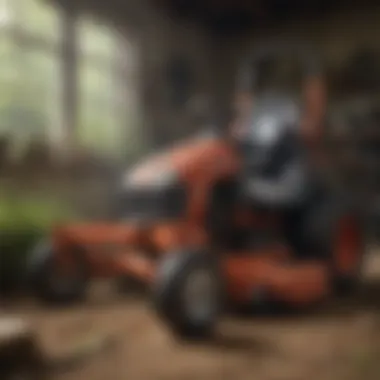
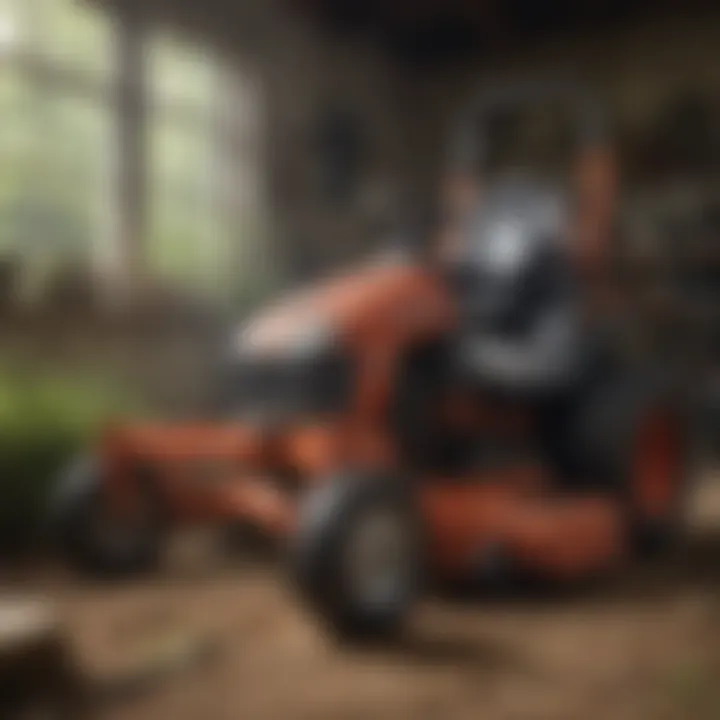
Benefits of Zero Turn Mowers:
- Speed: Zero turn mowers often cut grass faster due to their superior design.
- Precision: The tight turns lead to cleaner, more even cuts.
- Reduced Fatigue: Operators find less effort is needed to steer and navigate.
Drawbacks of Regular Riding Mowers:
- Slower Operations: The traditional design may slow down lawn care tasks.
- Less Versatility: Difficulties arise when working in complex landscapes.
Overall, zero turn mowers suit homeowners who prioritize efficiency or have complex lawns needing detail-oriented care.
Suitability for Different Lawn Types
The choice of mower is highly dictated by the type of lawn one maintains. Some lawns are larger and more open; others might have intricate landscaping and numerous obstacles. To understand this aspect, it’s essential to categorize the differing lawn types.
- Flat and Open Lawns: For expansive lawns, both zero turn and regular riding mowers can perform well. However, a zero turn mower will achieve a closer cut faster, saving time.
- Uneven or Slopey Terrain: Standard riding mowers often handle slopes better, as zero turn mowers can be more challenging to control on steep inclines. Consideration of the terrain can influence performance.
- Landscaped Areas with Obstacles: In settings layered with gardens or trees, zero turn mowers excel, enabling better navigation without sacrificing speed.
In summary, selecting the ideal mower requires careful assessment of the lawn’s characteristics, along with personal requirements.
Understanding these vital differences will aid not only in equipment selection but also ensure optimal results in lawn care. Whether one opts for a zero turn or regular riding mower, the right choice can lead to improved efficiency and satisfaction in maintaining a residential landscape.
User Experiences and Case Studies
User experiences and case studies are invaluable in understanding the real-world applications and impact of residential zero-turn mowers. Testimonials from homeowners provide practical insights into how these machines perform in various conditions. Additionally, comparative case studies shed light on the differences in efficiency and functionality across diverse landscapes. This section forms a bridge between theory and practice, revealing the authentic benefits and challenges faced by users.
Homeowner Testimonials on Zero Turn Mowers
Homeowners often share their personal accounts of using zero-turn mowers, which can be quite revealing. Common themes include ease of use, superior maneuverability, and cutting quality. Many users highlight how these mowers transformed their lawn care routines, making tasks less time-consuming and more effective.
For instance, one homeowner reports that transitioning from a traditional riding mower to a zero-turn model significantly reduced mowing time, allowing for more time spent on gardening and landscaping. Their experience underscores the efficiency that zero-turn mowers can deliver.
Here are some key points that are typically emphasized in testimonials:
- Maneuverability: Many users indicate that they find zero-turn mowers easier to navigate around trees and flower beds, thanks to their design.
- Precision Cutting: Homeowners appreciate the clean, well-defined edges that these mowers produce, often mentioning improved aesthetics.
- User Comfort: Comfort during operation is a frequent mention, as users enjoy adjustable seats and easier controls compared to pushing mowers.
This feedback is critical for potential buyers, as it gives insight into dealing with challenges specific to residential properties.
Comparative Case Studies: Performance Across Various Landscapes
Comparative case studies provide an objective analysis of zero-turn mower performance across different types of properties. These studies often evaluate factors such as cutting efficiency, engine performance, and adaptability to various terrains.
For instance, a study might focus on comparing zero-turn mowers used in small urban lawns to those used in larger rural properties. The results reveal distinct performance metrics.
Some highlighted considerations include:
- Terrain Type: Mowers designed for flat surfaces may not perform well on hilly or uneven ground. Users need to select models tailored for their specific landscape.
- Cutting Speed: The cutting speed can vary widely based on the mower's design. Studies often illustrate this performance for maintaining aesthetic appeal in different lawns.
- Fuel Efficiency: Another important aspect revealed through case studies can be how fuel-efficient a zero-turn mower is under various conditions.
"Understanding how zero-turn mowers perform in differing environments can help homeowners make informed decisions aligned with their specific lawn conditions."
Future Innovations in Zero Turn Mower Technology
As the landscape of lawn care evolves, particularly in residential settings, the advancements in zero turn mowers are both intriguing and vital. Future innovations in zero turn mower technology hold great significance, as they correlate with efficiency, performance, and user experience. Embracing these modern enhancements not only improves the usability of the equipment but also addresses growing concerns about environmental sustainability and technological integration.
Emerging Trends in Lawn Care Equipment
Several trends are shaping the future of lawn care equipment, particularly among zero turn mowers:
- Autonomous Operation: Integration of turf care robots into residential settings is becoming more prevalent. These automated machines can mow without human intervention, using GPS and sensors for precision. Homeowners with large lawns may find this beneficial, as it allows for a hands-off approach to lawn maintenance.
- Smart Technology: Enhanced connectivity features allow users to control and monitor mowers remotely via smartphones. Notifications about maintenance reminders or operational status can help in maintaining optimal performance.
- Battery-Powered Models: As electric technology improves, more battery-powered zero turn mowers are entering the market. They provide quieter operations, give off fewer emissions, and reduce fuel costs. This shift not only simplifies maintenance but also appeals to environmentally conscious homeowners.
"With autonomous and electric options emerging, the future of lawn care may change significantly, allowing for smarter and more efficient grass management."
- Enhanced Ergonomics: Future designs will focus on reducing operator fatigue. This includes adjustable seat designs, better control placements, and improved vibration-dampening technology. A comfortable rider will likely lead to better mowing outcomes.
Sustainability in Mower Design
Sustainability is a vital aspect of future developments in the lawn care industry. As consumers become more aware of their environmental impact, manufacturers are responding by incorporating sustainable practices into mower design:
- Recyclable Materials: New models are increasingly constructed with recyclable materials that reduce waste. Mowers designed with sustainability in mind not only appeal to eco-conscious buyers but also decrease the amount of plastic and metals in landfills.
- Fuel Efficiency Improvements: Future zero turn mowers aim to maximize fuel efficiency. New engine technologies focus on optimizing combustion processes to reduce fuel consumption and emissions.
- Integration of Solar Power: Some manufacturers are exploring the use of solar panels to power mowers. Solar energy can supplement traditional power sources, decreasing reliance on fossil fuels and promoting green energy.
- Eco-focused Features: Some products might include features like mulching capabilities that reduce the amount of waste sent to landfills, helping to nourish the lawn naturally.
In summary, innovations in zero turn mowers will shape the future of lawn care by enhancing efficiency, sustainability, and user experience. These advancements not only make mowing easier but also help in creating a greener and more efficient approach to lawn maintenance.



